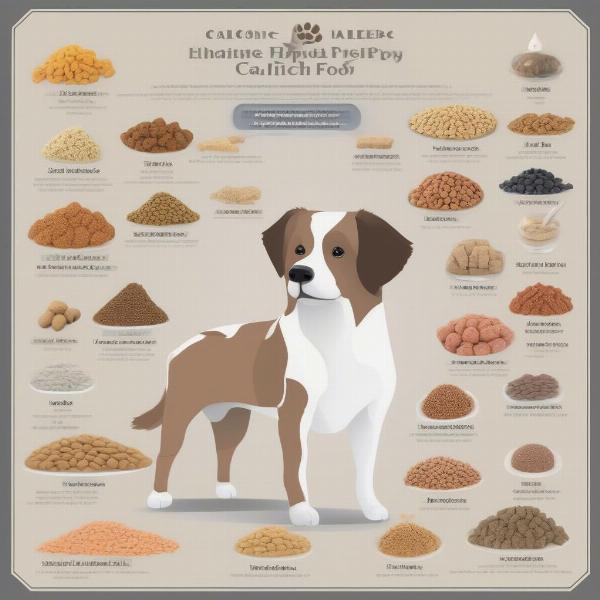Amirene dog food is a topic that sparks curiosity among pet owners. Understanding the nuances of canine nutrition is crucial for your dog’s health and well-being. This comprehensive guide delves into the essential aspects of dog food, including ingredient analysis, nutritional needs based on breed and life stage, and how to choose the right diet for your furry companion.
Deciphering Dog Food Labels: What to Look For
Choosing the best food for your dog can feel overwhelming with so many options available. Start by carefully examining the ingredient list. Look for whole meat sources as the primary ingredients, such as chicken, beef, lamb, or fish. Avoid ambiguous terms like “meat by-products” as these can indicate lower quality ingredients. High-quality protein sources provide the essential amino acids for muscle development and overall health.
Next, consider the carbohydrate sources. Wholesome grains like brown rice, oats, and barley provide fiber and energy. However, some dogs have sensitivities to grains, so grain-free options with alternative carbohydrate sources like sweet potatoes or peas may be preferable.
Finally, check for added vitamins and minerals. These supplements ensure a balanced diet, particularly for specific life stages like puppyhood or senior years.
Nutritional Needs Across Different Life Stages
A puppy’s nutritional needs differ significantly from those of an adult or senior dog. Puppies require higher protein and calorie content to support rapid growth and development. Adult dogs need a balanced diet to maintain their energy levels and overall health. Senior dogs often benefit from lower calorie diets with increased fiber to support healthy digestion and joint health.
Is Amirene the Right Choice for Your Dog?
While “Amirene” isn’t a widely recognized dog food brand, the principles of choosing a quality dog food still apply. Regardless of the brand, prioritize whole meat sources, healthy carbohydrates, and added vitamins and minerals. Consult with your veterinarian to determine the best dietary choices for your dog’s specific needs, breed, and health condition. They can offer personalized recommendations and guide you towards a nutritious and appropriate diet.
Choosing the Right Food for Your Dog’s Breed
Certain breeds are predisposed to specific health issues that can be influenced by diet. For instance, large breeds are prone to hip dysplasia, and a diet rich in calcium and phosphorus during puppyhood can exacerbate this condition. Small breeds may benefit from smaller kibble sizes to facilitate easier chewing and digestion. Researching breed-specific dietary recommendations can help you make informed choices for your dog’s long-term health.
 Dog breed nutrition: Images of different dog breeds with their appropriate food types.
Dog breed nutrition: Images of different dog breeds with their appropriate food types.
Conclusion
Selecting the right dog food is a crucial aspect of responsible pet ownership. By understanding your dog’s individual needs and focusing on high-quality ingredients, you can ensure they receive the optimal nutrition for a long and healthy life. Remember to consult with your veterinarian for personalized advice. A balanced and nutritious diet is the foundation of your dog’s well-being.
FAQ
- What are the key ingredients to look for in dog food? Prioritize whole meat sources, wholesome carbohydrates, and added vitamins and minerals.
- How do I choose the right food for my puppy? Puppies need higher protein and calorie content than adult dogs. Consult your veterinarian for breed-specific recommendations.
- What are the dietary considerations for senior dogs? Senior dogs often benefit from lower calorie diets with increased fiber to support healthy digestion and joint health.
- My dog has allergies, what should I do? Consult with your veterinarian to determine the best hypoallergenic food options for your dog.
- How do I know if my dog is getting the right nutrition? Monitor your dog’s weight, coat condition, energy levels, and stool quality. Regular check-ups with your vet are also essential.
- What should I do if my dog refuses to eat their new food? Gradually transition to the new food by mixing it with the old food over a period of several days.
- Are grain-free diets always better for dogs? Not necessarily. Some dogs thrive on grain-free diets, while others do well with grains. Consult your veterinarian for personalized advice.
About ILM Dog: ILM Dog is your trusted resource for expert advice on all aspects of dog care, from breed selection and nutrition to training and health. We offer practical, evidence-based guidance to help you provide the best possible care for your canine companion. Whether you’re a seasoned dog owner or just starting out, ILM Dog offers valuable insights into every stage of your dog’s life. Contact us at [email protected] or +44 20-3965-8624 for personalized guidance.